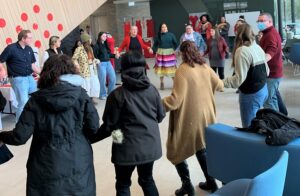A Minute for Our Relatives: Action against gender-based violence
Trigger warning: readers may be triggered by the mention of domestic violence. Community Assistance Program (CAP) can be accessed for citizens of the Anishinabek Nation: 1-800-663-1142.

By Kelly Anne Smith
NORTH BAY— Student engagement during 16 Days of Activism on Gendered Violence at Nipissing University raised donations for local women’s organizations.
Students of the Indigenous Health & Wellness class organized the event A Minute for Our Relatives: Honouring Indigenous Victims of Gendered Violence on Nov. 28. Drumming, dancing, information-sharing, and poetry reading took place in the Nipissing University Student Union (NUSU) foyer.
The 16-day activism campaign against gender-based violence begins Nov. 25 on the International Day for the Elimination of Violence Against Women and continues to December 10, Human Rights Day.
Nancy Stevens, Assistant Professor and Co-Chair of Indigenous Studies at Nipissing University oversaw A Minute for Our Relatives.
“We started with a smudge, and I sang a welcoming song. We had people out including the president of the university and the students were so thrilled.”
Stevens says it is critical to sustaining efforts of awareness for MMIWG2S people.
“How Indigenous people viewed each other prior to colonization, women, and everybody was viewed as sacred, worthwhile, worthy of respect,” she explains. “The paternalistic attitudes that were brought over with incredibly problematic attitudes have persisted over time. The really sad thing is the negative view of women.”
Stevens says men who have misogynistic and paternalistic ideas are impacted.
“Even though they may not recognize how holding such a negative view of women harms them,” she says. “I don’t know how we get past that unless people come to a place where they view all life as sacred, not just humans but all life. And not in a religious sense but in the sense that we are all connected. We are all related.”
A big part of the student’s efforts in the noon-hour A Minute for Our Relatives was a donation drive, Stevens explains.
“One of the students suggested a donation drive for feminine hygiene products for women who are maybe fleeing domestic violence or are street-involved. The Ojibway Women’s Lodge and True Self Debwewendizwin were recipients.”
Donors filled up the boxes says Stevens.
“We had donations of body wash and shampoo, oodles of pads and tampons, some donations of socks, bars of soap, some toothpaste, and laundry soap. We just divided up the donations today and are being taken over to those organizations over this week,” she says. “One of the students – her mom works in her community doing a lot of support for women – she put together a bunch of bags that she called moon time rescue bags. Moon time being of course menstrual cycles. There were pads and tampons with other supplies as well.”
“It turned out to be really, really great,” adds Stevens. “We had some excellent, excellent singers. There was Cody McKenzie-Sackaney, Jacob Dayfox, Gerry McComb, and Darren Nakogee.”
The university’s Office of Indigenous Initiatives Community Learning Service Officer Christine Benoit helped coordinate the gathering and with Amelia Rising, and invited Vanessa Brouseau to speak later in the evening. On social media, Brousseau is the Resilient Inuk bringing awareness to MMIWG2S with her message of No More Stolen Sisters.
Vanessa Brousseau recalled the horrible moments learning about her sister Pamela Holopainen. Pam disappeared in 2003 at the age of 22.
“I knew right away that something was not right. So, my mother and I instantly went to the police. It was New Year’s Eve and when we went to the police to report my sister missing, they told us she was probably out drinking and she’d be back in a couple of days.”
Vanessa and her mother didn’t wait a couple of days.
“We made our own posters. We called all our friends. We went looking ourselves. We tried to find my sister.”
Months later, police told Vanessa that her sister’s common law spouse led them to believe Pam was working as a prostitute, which Vanessa says is not true.
“We didn’t get a real investigation on my sister’s case. I really believe that’s why my sister is still missing…because of the delayed reaction of the Timmin’s police. And this is something that the Timmin’s police and other police do to Indigenous people. They need to act quicker. It’s part of the 231 calls for justice.”
Vanessa says she doesn’t have all the answers, but she knows what is not working.
“What’s not working is our system. Our judicial system is not working. Also, men need more training to know where women are coming from. And women need to be running programs for women. I’m all about women for women. It’s more comforting for women as a woman myself,” she explains. “More importantly, change our education system. If we teach our kids young, healthy boundaries and respecting each other. I know it happens in the home but if we could try to teach them while they are young and in school, we could possibly be a big part of preventing gender-based violence.”

